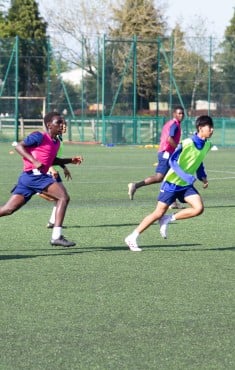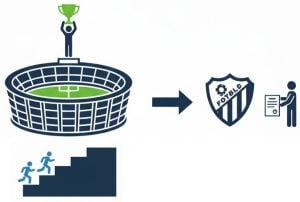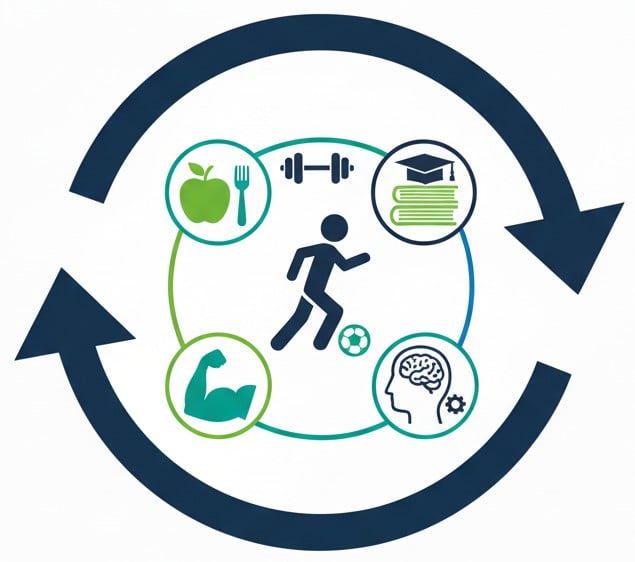The Best High Performance Soccer Academies – Elite Soccer Training 2026
Soccer schools for children
Train to become a professional soccer player in a high performance soccer academy – a boarding school where students can take part in an intensive professional soccer player training program while receiving a world-class education. Use the infographics below to review the four best football academies in the world. Continue reading for more information about high performance soccer academies including information about student life, training, food, accommodation, etc.

What are international soccer academies?
International football academies combine professional training with solid academic expertise, allowing young talents to enjoy a unique experience abroad. They are designed for footballers between the ages of 12 and 21 who wish to:
- Reach their full sporting potential.
- Gain exposure to professional clubs or universities.
- Study languages and earn international qualifications.
- Have a life-changing experience.
We have created a PDF with the most important information for each Football Academy.
Why choose an international academy?
- Elite training: with professional coaches.
- Personalized education: secondary, higher, or university education.
- International exposure: club trials and global visibility.
- International experience: learn languages and grow personally.
Available programs
- Annual academic programs
- Semester or quarterly courses
- Summer camps (ideal option to try out the academy)
- Preparation for university scholarships (USA)
What does the program include?
- Daily professional training
- National or international competitions
- Homestay or family accommodation
- Full board
- Academic studies
- Medical insurance
- Visa support
- 24/7 assistance
Location of the Academies
On this map you can see the locations of our high-performance academies in Spain:
What is an international football academy and how does it differ from a youth football academy?
If you are interested in soccer and are thinking of taking your training (or that of your son or daughter) to the next level, it is important to understand the difference between two concepts that are often confused: high-performance academies and professional club youth academies. Although both places aim to train footballers, there are key differences in how they work and who they are aimed at.
1. Quarry of a professional club
A youth academy (cantera) is the official training system of a professional soccer club. For example, the youth academy of FC Barcelona, Real Madrid, or Atlético de Madrid. It is directly integrated into the club and its main objective is to train the future players of the first team.

Only a few get in
To enter a youth academy, players must pass very demanding tests. Players are usually selected at a very young age and are only admitted by invitation from the club.

Club-focused training
All training follows the club’s philosophy and style of play. All efforts are focused on improving as a team, not on individual player development.

Real possibilities of reaching professional football
If you excel, you can advance within your own club or be signed by other teams.
2. High Performance Academy
A high-performance academy is an independent center, not linked to a specific professional club, where talented footballers are trained to improve their technical, physical, and mental level.

More open access
Although there are also selection processes, it is much more accessible than the quarries.

Comprehensive Approach
We focus not only on soccer, but also on nutrition, physical development, sports psychology, and academic education. We focus 100% on the player’s individual development.

Goal: Prepare you for opportunities
The academy aims to prepare players to be seen by professional clubs or to access tryouts with national or international teams.
In summary
Feature
Professional Club Quarry
High Performance Academy
Dependence
Part of a professional club
Independent
Main objective
Train players for that club
Improve your level to get opportunities
Access level
Very selective
Selective, but more accessible
Style of play
The one from the club
Varies by academy
Training approach
Soccer
Football + comprehensive training
An international football academy combines high-performance sports training with academic studies, all in a multicultural environment. It is designed for young talents who wish to develop professionally in football without neglecting their education.
Frequently Asked Questions (FAQ)
General nformation
At what age can my child enroll in an academy?
Most academies accept students from 15 or 16 years old. However, there are options for those as young as 8-10 years old. There are also options for youngsters aged 16-22 who want to make the leap to professional soccer or prepare for university entrance with athletic scholarships.
Can my child become a professional soccer player?
There are no guarantees, but there are real opportunities. This will depend on the player’s natural talent, as well as their ability to improve and their discipline during their formative years. Academies work with qualified coaches, provide exposure to scouting matches, and establish agreements with professional clubs. In addition, your child will receive high-level athletic training and the tools to access soccer trials.
Is it safe to send my child abroad at a young age?
The academies are equipped to welcome international students, with tutors, medical care, supervised accommodation, and family support. Furthermore, the multicultural environment encourages adaptation, language learning, and personal maturity.
Where are the best international soccer academies located?
Some of the most renowned academies are located in Spain, the United Kingdom, France, Italy, or the United States. The choice depends on your goals: professional development, language, academic level, or opportunities to be noticed by scouts, etc.
How can I know if an academy is reputable and of quality?
Trust a specialized agent like Ertheo, who can offer you their experience and impartial advice on each of the options, at no extra cost to you, to help you maximize this investment in your children’s future.
Start your journey toward international professional or college soccer today.
Why attend a high performance academy?
Students attend high performance soccer academies with the objective of becoming professional soccer players. The academies combine an intensive professional soccer player training program with the equivalent of a secondary education to prepare the students to enter universities or join the work force. High performance academies offer young soccer players the opportunity to train at a high level without neglecting their education and are dedicated to building the character of their students and raising responsible and respectful young adults.
For how long can students attend a high performance academy?
Students can usually enroll in a high performance soccer academy for one to three years according to the education program that they choose.
Who would be the ideal candidate for a high performance academy?
The ideal candidate for one of these football academies is a young soccer player who wants to become a professional player, has good character on and off the field, and who wants to continue his education to ensure a promising future.
Since high performance academies are so flexible with their education options, they accept a wide range of ages (usually from 13 – 21).
Age 13 – 17/18: Soccer players age 13 to 17 or 18 can join high performance academies and continue their secondary education while at the academy through distance online learning or by attending a private secondary school with other academy students and other students in the area. Younger students can even stay at high performance academies for many years completing almost all of their secondary education at an academy while they prepare to become professional soccer players. Students from 16 – 17 years old can also take SAT prep courses at some of these academies to prepare for entrance to American universities.
Age 18 – 21: Most high performance academies offer different courses for university preparation or vocational courses for students over 18 at the academy. At the high performance academy in Valencia, for example, students up to 21 years old can take a wide range of sports-related courses while they train to become professional players. Some of these courses include soccer coaching, sports nutrition, creation of sports apps, software for soccer coaches, intro to sports management.
These high performance academies are really flexible and do what they can to combine high-quality education and training for all talented, hardworking soccer players who have the potential to play professionally.
Do high performance academies accept boys and girls?
High performance academies tend to accept boys only, but some do accept girls depending on the number of girls applications they receive.
Student life
What is a typical day like at a high performance academy?
From Monday to Friday, the students follow an organized time table. The day is divided into three primary parts: classes, training, and rest. At some of these football academies, students train in the morning and attend classes in the afternoon. Other football academies follow the opposite schedule with classes in the morning and training in the afternoon. Weekends are usually dedicated to matches and/or tournaments and rest. On some weekends, the academies organize excursions so that students can explore the city where the academy is located and its surrounding areas.
Can students leave the campus?
Students of legal age are allowed to leave the campus. Minors, however, need to submit parent authorization, or they won’t be able to leave campus without an academy monitor.
Is there a daily curfew?
Every high performance soccer academy does have an enforced curfew. The day is long and hard, and students need sufficient rest to succeed on the soccer field and in the classroom.
What is the best soccer school for 20-year-olds and 18-year-olds?
Ages are also important when choosing between academies. If you are looking for a soccer school for 20 year olds, one of the best choices is the academy in England, as it offers very attractive educational options for those ages and the coexistence will be with kids of similar age. The academy in Barcelona is the other soccer school for 20 year olds available and accepts kids up to 21 years old in its courses.
Parents who resolve their doubts with Ertheo before enrolling their children in a soccer academy have a much more satisfactory final experience.
Do you have a question?
Education
What kind of education options do the academies offer?
Education options at high performance soccer academies vary according to the country in which they’re located. Students can either choose to adapt to the education system of the destination country and join other students at a secondary school in the area, or students can choose to continue studying at their original secondary school through distance education.
Students who decide to follow the education system of the country where the academy is located are sometimes required to complete adaptation courses. If the student decides to continue studying through distance education, the academies provide personal tutors to help the students with their studies.
Some high performance academies take place at high school or university campuses and, therefore, have their own learning centers on campus. In other cases, the academies transport the students to nearby secondary schools where they either attend classes with other students in the area or complete their distance education requirements with academy tutors. High performance academies tend to work with private schools.
Still, other high performance academies offer specific courses that students can complete usually related to the world of soccer such as coaching courses or physical training courses.
Do you get a normal high school diploma when you graduate from a high performance academy?
Yes, the high performance soccer academies have agreements with a large number of secondary schools (usually private schools) in their surrounding areas. Students attend these secondary schools and earn their diplomas through these schools. If they continue to study with their original schools through distance education, they’ll graduate with a diploma from their original school.
What are classes like?
If the student decides to adapt to the education system of the country in which their high performance soccer academy is located, the exact style of teaching will be determined by the specific school the student attends. The high performance academies only work with prestigious secondary schools (usually private schools) so students are guaranteed to receive a great education. Students also attend classes at these schools with other students who don’t attend the high performance academy.
If the student chooses to continue studying with their original school through distance education, their curriculum will be determined by their own original school according to their distance education policy.
What kind of extra help options are there for students who struggle in the classroom?
Teachers at the schools where high performance academy students attend classes do all they can tell help the students improve their grades.
What kind of qualifications do the teachers have?
The teachers make up part of the staff at the secondary schools that the students attend to complete their studies and, therefore, have years of experience and official titles and certifications for teaching secondary students.
Parents who resolve their doubts with Ertheo before enrolling their children in a soccer academy have a much more satisfactory final experience.
Do you have a question?
Training
What is training like?
The students train for up to four hours a day at the academy, and training structure and intensity mirrors the training of a professional soccer team. They also attend classes and workshops where coaches discuss strategy, nutrition, injury prevention, etc.
What kind of physical conditioning do the players undergo?
The players partake in physical conditioning sessions inside and outside of the gym as well as training sessions exclusively dedicated to training with the ball. At some academies, players use the swimming pool as another form of physical conditioning. Like field training, physical conditioning follows the same structure and intensity as that of a professional soccer team.
Is there match play?
Certain high performance academies have their own soccer teams formed exclusively by students at the academy. They attend matches as an official team every weekend. Other academies, meticulously organize tournaments where they put into practice all that the students have learned during the week.
Do all players experience an equal amount of playing time?
The academies cannot guarantee that all players experience the same amount of playing time during competitions. However, they do guarantee that all players train in the same way and are expected to meet the same weekly demands. Therefore, all players have the same opportunities to earn playing time in matches and tournaments.
What kind of qualifications do the coaches have?
Coaches and trainers at each high performance soccer academy have extensive coaching experience. Some even have experience coaching professional teams.
Are players scouted by professional coaches or college coaches while at the academy?
Some coaches and scouts do attend competitions to evaluate the players’ skills. That being said, academy coaches are usually more helpful than scouts in helping the players kick off their professional careers. Academy coaches can put players into contact with professional coaches and professional teams. Often times, coaches organize trials with professional teams for the best players at the academy.
What happens if a player gets injured?
Each high performance soccer academy has medical personnel on campus at the academy and a medical center where they can treat injuries. As soon as a player is injured, their parents are immediately informed about the injury and the treatment that their child will receive. Many academies are insured which means students are immediately insured upon being admitted. Other academies require their students to have insurance to enter the academy.
Parents who resolve their doubts with Ertheo before enrolling their children in a soccer academy have a much more satisfactory final experience.
Do you have a question?
Accommodation & facilities
What is accommodation like at a high performance academy?
Most high performance soccer academies have their own accommodation on the same campus where trainings take place. In other cases, the academies provide off-site accommodation, and students travel to and from the residence and training by bus.
The exact living situation of the students varies greatly from one high performance soccer academy to another. Some academies provide smaller rooms shared by two to four students. In other academies, up to 16 students can share one room. Likewise, whether or not students have their own private restroom or share among many students varies from one academy to the next.
Is there a cleaning service for the rooms? Or do the students clean their own rooms?
The academies tend to contract a cleaning service where the rooms are cleaned and fresh, clean bed sheets are provided every two to three days. That being said, academy personnel is in charge of making sure that the students keep their rooms and their belongings well-organized during their entire stay.
How is laundry taken care of at the academy?
The academies always take charge of washing the students’ sheet and uniforms. Some academies take it upon themselves to wash the students’ daily casual clothes as well. Other academies don’t provide this laundry service but do have laundry rooms where the students can wash and iron their own clothes accompanied by a monitor.
Are there stores on campus where children can buy necessities such as shampoo?
Some academies have on-campus stores where the students can shop for food, clothes, or hygiene products. Other academies don’t have such stores on-site; however, students can leave the campus (minors accompanied by academy monitors) to buy any products they need.
Are there any extra facilities available to the students such as swimming pools, basketball courts, tennis courts, etc.?
This really depends on the specific high performance soccer academy in question. Some of these soccer schools have different sports facilities the students can use such as a gym, futsal, basketball, or tennis courts, a swimming pool, extra study rooms, etc. It’s a good idea to investigate whether or not the soccer academy you’re thinking about attending has such facilities available for students during their free time.
Food
What kind of food service is offered at the academies?
Most high performance academies provide buffet style food service and also provide special menu options at the students’ requests.
Does the food properly supplement high performance training?
Proper nutrition is taken seriously at high performance academies. All meals are planned by nutritionists to ensure that the students have enough energy to succeed both on the soccer field and in the classroom.
What if a student is hungry outside of typical dining hours?
The academy provides students with break, lunch, and dinner as well as a mid-morning and late afternoon snack. However, if the students are still hungry outside of normal dining hours, they can buy food from the academy’s own cafeteria, from a vending machine, or from a nearby supermarket (accompanied by a monitor if under 18 and/or without parent authorization to leave the campus).
Are there special menus available for food allergies or sensitivities?
Yes, every high performance soccer academy is extremely accommodating in terms of food service. The academies can provide menus for every dietary need from lactose-free to gluten-free to vegetarian etc.
Parents who resolve their doubts with Ertheo before enrolling their children in a soccer academy have a much more satisfactory final experience.
Do you have a question?
Staff & student relations
Is counseling available at the academies in case my child experiences personal issues or issues with other students or staff members?
Spending a year away from home can be quite difficult for just about anyone, but high performance academy staff and personnel do their best to create a cozy, friendly environment so that students can feel at home at the academy. All players who have attended full-year programs at high performance academies return home deeply satisfied and with new friendships that will last a lifetime.
Nevertheless, some students do have extra trouble adapting to their time away from home. For those students, counselors and psychologists are available to help them adapt to their new life at the academy. Students can also confide in these counselors and psychologists for any other personal issues they might experience while at the academy.
What are the academies’ policies on bullying?
High performance soccer academy personnel is highly aware of everything that’s goes on at the academy. They talk to the students on a daily basis and know how to detect problems among students. That being said, the academies have strict no-bullying policies, and academy staff resolves any and all conflict among students the moment the conflict arises. Additionally, students can take advantage of the counselors and psychologists at the academy to resolve both conflicts with each other and inner conflict.
What happens if my child doesn’t get along with his/her roommates?
This type of problem doesn’t typically occur at a high performance soccer academy. The students spend a lot of time together and start to feel like they are a family in a short amount of time. That being said, if students have problems with their roommates, academy staff will talk to the students and try to resolve the conflict. If conflict continues, the academy will do what they can to separate the students and put them in different rooms.
What kind of supervision is in place when the children aren’t on the pitch or in the classroom?
Students are never alone during their time at a high performance soccer academy. Whether at the residence or on excursions in nearby cities, the students are supervised by academy personnel at all times. Furthermore, all monitors have experience managing large groups of adolescents and keeping all students safe.



